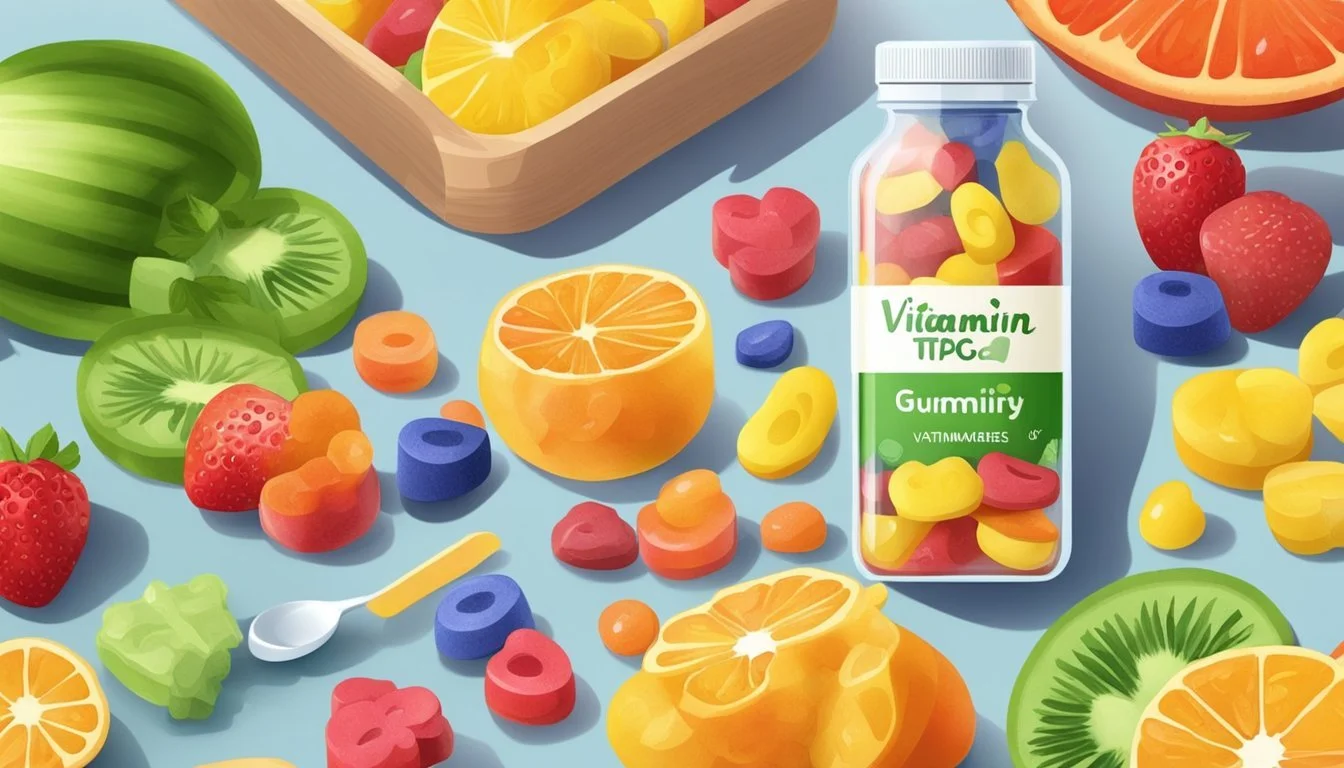Tasty Health Boost: The Ultimate Guide to Vitamin Supplement Gummies
Vitamin gummies have gained popularity as a tasty alternative to traditional supplements. These chewable treats offer a convenient way to consume essential nutrients, appealing to both adults and children who struggle with swallowing pills. Gummy vitamins typically contain a variety of vitamins and minerals, including B-complex, vitamin D, and vitamin C, designed to support overall health and well-being.
While gummy vitamins may seem like an easy solution for meeting daily nutrient requirements, their effectiveness compared to traditional supplements has been questioned. Some studies suggest that the manufacturing process and added sugars in gummy vitamins may impact their potency and stability. Additionally, the dosage of nutrients in gummy vitamins can be less precise than in pill form.
Despite potential drawbacks, gummy vitamins can still play a role in supplementing diets for those who consistently avoid or dislike traditional vitamins. When considering gummy vitamins, it's important to choose reputable brands and consult with a healthcare professional to ensure they align with individual nutritional needs.
Understanding Vitamin Supplements
Vitamin supplements come in various forms, each with distinct characteristics. These supplements play crucial roles in health, with pills and gummies being popular options. The Food and Drug Administration oversees their regulation.
Role of Vitamins in Health
Vitamins are essential nutrients that support numerous bodily functions. They aid in energy production, immune system function, and cell growth. While a balanced diet typically provides sufficient vitamins, supplements can fill nutritional gaps.
Vitamin D supports bone health and immune function. B vitamins contribute to energy metabolism and nerve function. Vitamin C acts as an antioxidant and supports collagen production.
Deficiencies can lead to health issues. For example, low vitamin B12 may cause anemia, while inadequate vitamin D can weaken bones.
Pills vs. Gummies
Vitamin pills and gummies each have pros and cons. Pills often contain higher concentrations of vitamins and fewer additives. They're typically more cost-effective and have a longer shelf life.
Gummy vitamins offer improved taste and ease of consumption. This makes them appealing to those who struggle with swallowing pills. However, gummies may contain added sugars and calories.
Feature Pills Gummies Concentration Higher Lower Additives Fewer More Taste Less appealing More appealing Shelf life Longer Shorter
Dosage accuracy can be a concern with gummies. Heat and time may affect their vitamin content, potentially leading to inconsistent doses.
Regulation by the FDA
The Food and Drug Administration (FDA) regulates vitamin supplements as dietary supplements. Unlike drugs, supplements don't require FDA approval before hitting the market.
Manufacturers must ensure their products are safe and properly labeled. They must follow Good Manufacturing Practices (GMPs) to maintain quality standards.
The FDA can take action against unsafe products or false claims. However, it doesn't routinely test supplements for safety or efficacy.
Consumers should look for third-party tested products. Organizations like USP or NSF offer certification programs for supplement quality.
Types of Vitamin Gummies
Vitamin gummies come in various formulations to meet different nutritional needs. They offer a convenient and tasty way to supplement essential vitamins and minerals.
Multivitamin Gummies
Multivitamin gummies contain a blend of essential vitamins and minerals in a single chewable form. These typically include vitamins A, C, D, E, and B-complex. Many also contain minerals like calcium, magnesium, and zinc.
Multivitamin gummies are designed to provide broad nutritional support. They're popular among adults and children who struggle with swallowing pills.
Some brands offer gender-specific formulas, tailoring nutrient ratios to meet the unique needs of men and women. For example, women's multivitamin gummies often contain extra iron and folic acid.
Single-Nutrient Gummies
These gummies focus on delivering a specific vitamin or mineral. Common single-nutrient gummies include:
Vitamin C gummies for immune support
Vitamin D gummies for bone health
Biotin gummies for hair, skin, and nail health
Melatonin gummies for sleep support
Single-nutrient gummies allow for targeted supplementation. They're useful for addressing specific deficiencies or health concerns.
Some people prefer single-nutrient gummies to avoid excess intake of vitamins they don't need. This can be particularly important for fat-soluble vitamins like A, D, E, and K.
Specialized Formulas
Specialized gummy vitamins cater to specific health goals or populations. These include:
Prenatal gummies: Formulated for pregnant women, containing higher levels of folic acid and iron
Omega-3 gummies: Providing essential fatty acids for heart and brain health
Probiotic gummies: Combining vitamins with beneficial bacteria for gut health
Immune support gummies: Blending vitamins C, D, and zinc for immune function
Some specialized formulas target age groups, like children's gummies or senior formulas. Others focus on specific health concerns, such as hair growth or joint health.
These gummies often contain a mix of vitamins, minerals, and other nutrients tailored to their intended purpose. They offer a convenient way to address specific health needs.
Demographic-Specific Formulations
Vitamin gummies cater to diverse nutritional needs across different age groups and life stages. Manufacturers create specialized formulations to address specific requirements and preferences.
For Children
Children's gummy vitamins focus on essential nutrients for growth and development. These formulations often include vitamins A, C, D, and B-complex to support immune function, bone health, and energy metabolism.
Many children's gummies contain added calcium and iron to promote strong bones and prevent anemia. Manufacturers use fun shapes and fruit flavors to make them appealing to kids.
Dosages are carefully adjusted for smaller bodies. Parents should always supervise vitamin intake and store gummies out of reach to prevent overconsumption.
For Adults
Adult gummy vitamins offer a wide range of formulations targeting various health goals. Common ingredients include multivitamins, omega-3 fatty acids, and probiotics.
Some adult gummies focus on specific needs like heart health, joint support, or energy enhancement. These may include ingredients like CoQ10, glucosamine, or B-complex vitamins.
Manufacturers often create sugar-free or low-sugar options for adults concerned about calorie intake. Vegetarian and vegan gummies made with pectin instead of gelatin are also available.
For Women
Women's gummy vitamins address unique nutritional needs throughout different life stages. These formulations typically include higher levels of iron, calcium, and folic acid.
Many women's gummies contain biotin and vitamins A and E to support healthy hair, skin, and nails. Some formulations target hormonal balance with ingredients like evening primrose oil or chasteberry extract.
Manufacturers often create gummies specifically for premenstrual support or menopause symptom relief. These may include ingredients like vitamin B6 or black cohosh.
For Pregnancy
Prenatal gummy vitamins provide essential nutrients for fetal development and maternal health. Folic acid is a crucial component, helping prevent neural tube defects in early pregnancy.
These gummies often contain higher levels of iron to support increased blood volume and prevent anemia. DHA, an omega-3 fatty acid, is frequently included to support fetal brain and eye development.
Manufacturers carefully balance nutrient levels to meet increased needs without exceeding safe upper limits. Some prenatal gummies also include ginger to help alleviate morning sickness symptoms.
Nutritional Content and Potency
Gummy vitamins contain a variety of essential nutrients in a chewable form. Their composition, potency, and additional ingredients can vary significantly between products and brands.
Vitamin and Mineral Composition
Gummy vitamins typically include a range of vitamins and minerals. Common ingredients are vitamin A, vitamin D, vitamin B6, vitamin B12, folic acid, and biotin. Many formulations also contain minerals like calcium, zinc, and iron.
The specific nutrient profile varies by product. Some gummies focus on a single vitamin, while others offer a comprehensive multivitamin blend. Manufacturers often tailor formulations for different age groups or genders.
Nutrient amounts in gummies are generally lower than in traditional pill-form supplements. This is due to space limitations in the gummy format and taste considerations.
Comparing Potency to RDAs
Gummy vitamin potency often falls short of Recommended Dietary Allowances (RDAs). For example, a typical gummy might contain 50-100% of the RDA for vitamins A, D, and B12, but only 10-30% for minerals like calcium and iron.
Some nutrients, like vitamin C and B vitamins, are more stable in gummy form. Others, such as iron and calcium, are challenging to include in high amounts without affecting taste or texture.
It's important to check labels carefully. Dosage recommendations may suggest taking multiple gummies to reach desired nutrient levels.
Added Nutrients and Herbs
Many gummy vitamins incorporate additional nutrients or herbal extracts. These may include omega-3 fatty acids, probiotics, or botanical ingredients like elderberry or echinacea.
Some products focus on specific health concerns, such as immune support or energy enhancement. These specialized formulas often include higher doses of certain vitamins or minerals.
Added ingredients can boost the appeal and perceived benefits of gummy vitamins. However, their effectiveness and bioavailability in gummy form may vary.
It's crucial to consult with a healthcare provider before relying on gummy vitamins as a primary source of nutrients, especially for those with specific health needs or deficiencies.
Benefits and Risks
Gummy vitamins offer an appealing alternative to traditional supplements, but they come with both advantages and potential drawbacks. Their ease of consumption and palatability make them popular, yet careful consideration is needed regarding their effectiveness and safety.
Health Benefits
Gummy vitamins can help bridge nutritional gaps in diets. They provide essential vitamins and minerals that may reduce the risk of certain diseases. Some studies suggest that regular vitamin intake may lower the chances of developing heart disease and certain types of cancer.
Gummies are particularly beneficial for individuals who struggle with swallowing pills or have digestive issues. They're often formulated with nutrients like vitamin D, B12, and omega-3 fatty acids, which support bone health, energy levels, and cognitive function.
For children and adults with limited diets, gummy vitamins can be a crucial source of nutrients. They may help prevent deficiencies that could lead to health problems over time.
Nutrient Absorption
The chewable nature of gummy vitamins may enhance nutrient absorption for some individuals. Chewing breaks down the gummy matrix, potentially making vitamins more readily available for the body to absorb.
Some gummy vitamins are designed to be easier on the stomach than traditional pills. This can be particularly helpful for those with sensitive digestive systems or absorption issues.
However, the manufacturing process of gummies can affect nutrient stability. Heat used in production may degrade certain vitamins, potentially reducing their efficacy compared to other supplement forms.
Risks of Overconsumption
The candy-like taste of gummy vitamins poses a risk of overconsumption, especially in children. Excess intake of certain vitamins can lead to vitamin toxicity, causing symptoms ranging from nausea to more severe health complications.
Fat-soluble vitamins (A, D, E, K) are particularly concerning, as they accumulate in the body's fat tissues. Overconsumption can result in hypervitaminosis, potentially damaging organs like the liver.
Many gummy vitamins contain added sugars or sugar substitutes. Regular consumption may contribute to dental issues and affect blood sugar levels. Some brands use citric acid as a sugar alternative, which can erode tooth enamel over time.
Ingredients and Additives
Gummy vitamins contain a mix of active nutrients and inactive ingredients that give them their chewy texture and sweet taste. These components can vary between brands and formulations.
Sugar Content
Most gummy vitamins use sugar or sugar alcohols as sweeteners. Regular sugar like glucose syrup is common, providing 2-3 grams per serving. Some brands use sugar alcohols like xylitol or sorbitol instead. These provide sweetness with fewer calories but may cause digestive issues in large amounts. Sugar-free options sweetened with stevia or monk fruit exist for those limiting sugar intake.
Artificial Colors and Flavors
Gummy vitamins often contain artificial colors and flavors to make them more appealing. Common colors include Red 40, Blue 1, and Yellow 5. Natural colors from fruit and vegetable extracts are used in some formulations. Artificial flavors mimic fruits like berries or citrus. Natural flavors derived from real fruit are available in select products. Some brands avoid artificial additives entirely, using only natural colors and flavors.
Non-active Ingredients
Gelatin is the main ingredient giving gummies their chewy texture. Plant-based alternatives like pectin or agar are used in vegetarian formulas. Citric acid adds tartness and acts as a preservative. Other common additives include:
Corn starch for binding
Carnauba wax for coating
Maltodextrin as a filler
Sodium citrate for pH balance
These inactive ingredients help with texture, shelf life, and manufacturing processes but don't provide nutritional benefits.
Dietary Considerations
Gummy vitamin supplements present unique dietary considerations. These factors can impact their suitability for different individuals and lifestyles.
Allergens and Sensitivities
Many gummy vitamins contain common allergens like gelatin, soy, and fruit-derived ingredients. Manufacturers often use pectin as a gelatin alternative. Some products include artificial colors and flavors that may cause sensitivities in certain individuals.
Always check labels carefully for potential allergens. Some brands offer allergen-free options specifically designed for those with sensitivities.
Vegetarian and Vegan Options
Traditional gummy vitamins typically contain gelatin, an animal-derived ingredient. This makes them unsuitable for vegetarians and vegans. However, plant-based alternatives are now widely available.
Pectin-based gummies provide a vegetarian-friendly option. Agar-agar, derived from seaweed, serves as another vegan-friendly gelling agent. These alternatives allow those following plant-based diets to enjoy gummy supplements.
Organic and Non-GMO Choices
Organic gummy vitamins use ingredients grown without synthetic pesticides or fertilizers. Non-GMO options avoid genetically modified organisms in their production.
These choices appeal to consumers seeking more natural supplement options. Organic gummies often contain fewer artificial additives. Non-GMO products align with preferences for unmodified ingredients.
When selecting organic or non-GMO gummies, look for certifications on the packaging. These ensure the products meet specific standards for ingredient sourcing and production methods.
Manufacturing and Quality
Gummy vitamin manufacturing requires specialized processes and rigorous standards to ensure safety and efficacy. Quality control measures and third-party certifications play a crucial role in producing reliable supplements.
Quality Assurance
Gummy vitamin manufacturers implement strict quality control protocols throughout production. Ingredients undergo thorough testing for purity and potency before use. Production facilities adhere to Good Manufacturing Practices (GMP) set by regulatory bodies.
Batch testing verifies the final product meets specifications for nutrient content, consistency, and safety. This includes checks for contaminants and accurate dosing of active ingredients. Many companies use advanced analytical techniques like HPLC to quantify vitamin levels precisely.
Some manufacturers employ in-house labs for continuous quality monitoring. Others partner with independent testing facilities for additional verification. Stability testing ensures gummies maintain potency throughout their shelf life.
Third-Party Certifications
Third-party certifications provide extra assurance of quality and manufacturing standards. Common certifications include:
United States Pharmacopeia (USP) Verified mark
NSF International certification
ConsumerLab approval
These organizations conduct facility audits and product testing. They verify ingredient quality, manufacturing processes, and label accuracy. Some also check for contaminants and proper dosage.
Organic and non-GMO certifications are increasingly common for gummy vitamins. These verify the sourcing of natural ingredients and absence of genetically modified components.
Brand Reputation
Established brands often have a track record of consistent quality. They invest in research and development to improve formulations and manufacturing techniques. Many partner with nutrition experts to ensure their products meet scientific standards.
Transparency is key to building trust. Reputable brands disclose ingredient sources and manufacturing locations. They provide clear information on testing procedures and quality control measures.
Customer reviews and independent product testing can offer insights into real-world effectiveness. Brands that consistently receive positive feedback tend to maintain higher quality standards.
Some companies go beyond basic requirements, implementing additional quality checks or sourcing premium ingredients. This commitment to excellence can set them apart in a crowded market.
Considerations for Consumption
Proper consumption of vitamin gummies involves careful attention to dosage, timing, and potential interactions. These factors can significantly impact their effectiveness and safety.
Dosage and Serving Size
Vitamin gummy serving sizes typically range from 1 to 4 gummies per day. Always follow the recommended dosage on the product label. Exceeding this amount can lead to vitamin toxicity, especially for fat-soluble vitamins like A, D, E, and K.
Some gummies may contain lower nutrient concentrations than traditional supplements. Check the label to ensure you're getting adequate amounts of desired vitamins and minerals.
Sugar content in gummies can add up quickly. Many contain 2-8 grams of sugar per serving. Consider this when managing your overall sugar intake, especially if you have diabetes or are watching your weight.
When to Take Gummies
Take vitamin gummies with food to enhance absorption of fat-soluble vitamins. This can also help prevent potential stomach upset.
For best results, consume gummies consistently at the same time each day. This establishes a routine and ensures steady nutrient levels in your body.
Some vitamins, like B complex, may provide an energy boost. Consider taking these earlier in the day to avoid potential sleep disruptions.
Interactions with Medication
Vitamin gummies can interact with certain medications. Consult your healthcare provider before starting any supplement regimen, especially if you take prescription drugs.
Iron-containing gummies may reduce the effectiveness of some antibiotics and thyroid medications. Take these supplements at least 2 hours apart from such medications.
Vitamin K can interfere with blood-thinning medications like warfarin. If you're on these drugs, maintain consistent vitamin K intake and inform your doctor of any changes in your supplement routine.
Some gummies contain herbal extracts that may interact with medications. Always read labels carefully and discuss potential interactions with your healthcare provider.
Comparison with Other Forms
Vitamin gummies offer a unique option among supplement forms, each with distinct characteristics. Understanding how gummies compare to other formats can help individuals choose the best option for their needs.
Gummies vs. Chewables
Gummy vitamins and chewable tablets share similarities in ease of consumption. Both are designed for those who struggle with swallowing pills. Gummies have a softer texture and often more appealing flavors, making them popular with children and adults alike. Chewables typically have a firmer, chalky consistency.
Gummies often contain more sugar or artificial sweeteners to mask vitamin tastes. Chewables may have less added sugar but can have a more medicinal flavor. Dosage accuracy can be higher with chewables, as their firmer structure allows for more precise nutrient measurements.
Storage requirements differ. Gummies may melt in high temperatures, while chewables are more stable. Chewables often have a longer shelf life due to their drier composition.
Gummies vs. Capsules/Tablets
Capsules and tablets are traditional vitamin forms, offering precise dosing and longer shelf life. They typically contain no added sugars or flavors, focusing solely on nutrient delivery. Gummies, in contrast, prioritize palatability.
Capsules and tablets often pack more nutrients into a smaller size. This allows for higher potency or combination formulas that might be difficult to achieve in gummy form. They're also generally more cost-effective per dose.
Absorption rates can vary. Some nutrients in gummies may be more readily absorbed due to their partially broken-down state. However, specially designed capsules or tablets can offer targeted release profiles.
For those with difficulty swallowing pills, gummies provide a clear advantage. They're easier to consume and don't require water, enhancing compliance for some users.
Gummies vs. Liquids
Liquid vitamins offer rapid absorption and are easily adjustable for precise dosing. They're ideal for those who can't swallow any solid forms. Gummies, while chewable, still require some ability to masticate.
Taste is a significant factor. Liquid vitamins often have strong, sometimes unpleasant flavors that can be difficult to mask. Gummies excel in taste, making daily supplementation more enjoyable.
Liquid vitamins typically have shorter shelf lives once opened and may require refrigeration. Gummies are more stable at room temperature but can degrade in extreme conditions.
Portability favors gummies. They're easy to carry and consume on-the-go, while liquids can be messy and less convenient for travel or quick use.
Economic and Environmental Aspects
The vitamin gummies market balances cost considerations with growing sustainability demands. Manufacturers face challenges in producing affordable supplements while adopting eco-friendly practices.
Cost-Effectiveness
Vitamin gummies often come with a higher price tag compared to traditional pill formats. Production costs increase due to specialized equipment and ingredients needed for gummy manufacturing. However, economies of scale have enabled some companies to offer more affordable options.
Bulk purchasing of raw materials helps reduce costs. Streamlined production processes also contribute to keeping prices competitive. Some brands use alternative sweeteners or reduce sugar content to lower expenses.
Consumer demand for gummies remains strong despite higher costs. Many view the convenience and enjoyable format as worth the premium. Subscription models and larger package sizes provide cost savings for regular users.
Sustainable Practices
Eco-conscious consumers drive sustainability efforts in gummy vitamin production. Manufacturers are exploring plant-based gelling agents like pectin to replace animal-derived gelatin. This shift appeals to vegetarian and vegan markets while reducing environmental impact.
Packaging innovations focus on recyclable and biodegradable materials. Some companies use post-consumer recycled plastics for bottles. Others opt for compostable pouches or glass containers.
Energy-efficient manufacturing processes help reduce carbon footprints. Solar panels and waste heat recovery systems are becoming more common in production facilities. Water conservation efforts include closed-loop systems and improved cleaning methods.
Sourcing sustainable ingredients presents challenges. Brands are working with suppliers to ensure responsible farming practices for botanicals and fruits used in gummies.
Consumer Choices and Recommendations
Vitamin gummy supplements offer convenient options for consumers seeking to boost their nutrient intake. Several popular brands provide diverse formulations targeting specific health needs and preferences.
Selecting a Vitamin Gummy
When choosing vitamin gummies, consumers should consider their individual nutritional needs and dietary restrictions. Reading labels carefully is crucial to ensure appropriate dosages and avoid excess intake of certain nutrients.
Third-party testing certifications can provide assurance of product quality and accuracy. ConsumerLab found that 44% of multivitamins tested had quality issues, highlighting the importance of selecting reputable brands.
Sugar content is another key factor. Some gummies contain added sugars, while others use sugar alternatives like xylitol. Nordic Naturals Zero Sugar Vitamin D3 Gummies offer a sugar-free option with 1000 IU of vitamin D per serving.
Popular Brands and Products
Several well-known brands dominate the vitamin gummy market. Vitafusion offers a wide range of gummy supplements for various health concerns. Nature Made provides multivitamin gummies, soft gels, and tablets catering to different age groups and genders.
Garden of Life focuses on organic, plant-based gummy formulations. Their products often include probiotics and enzymes for added digestive support.
Consumer Reports surveys indicate that about half of U.S. adults take multivitamins, with gummies growing in popularity. However, gummy vitamins may be more likely to contain unreliable nutrient levels compared to other forms.
Nature's Bounty and Olly are other recognizable names in the gummy vitamin space, offering targeted formulations for sleep, beauty, and immune support.









